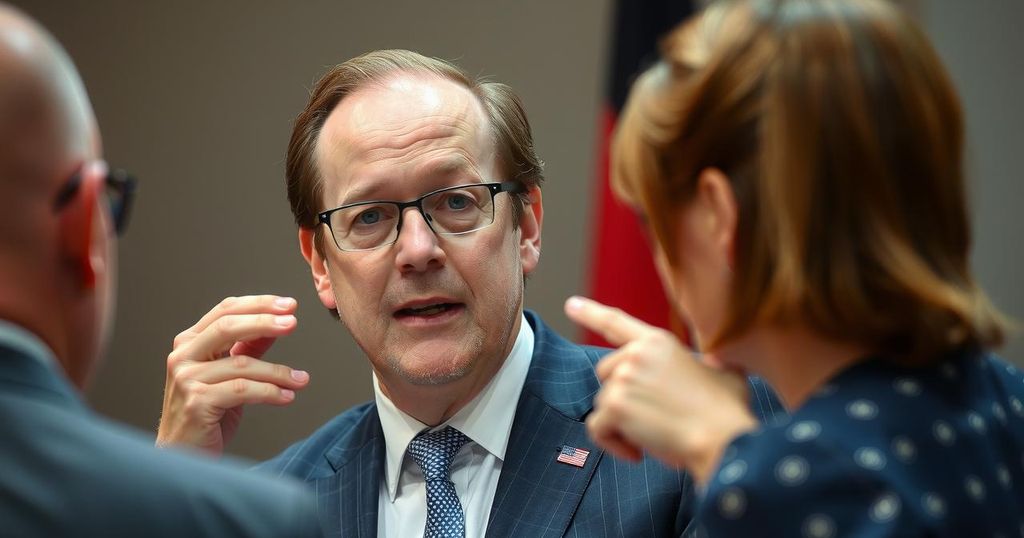Germany’s Political Landscape Shifts as Chancellor Olaf Scholz Calls for Early Elections

German Chancellor Olaf Scholz has lost a confidence vote, prompting early elections on February 23. This follows the collapse of his three-party coalition government. Scholz views this election as an opportunity for renewal amidst rising challenges from opposition parties, notably the far-right AfD, further complicating coalition possibilities in the future.
German Chancellor Olaf Scholz has recently faced significant political challenges, culminating in a lost vote of confidence within the parliament. While he anticipated the loss, Scholz strategically deemed this as a necessary step towards calling for early elections scheduled for February 23. This decision followed the collapse of his three-party coalition government just two months prior, rendering him the leader of a minority administration. Scholz now places the responsibility on the electorate to redirect the political path of the nation, initiating what is expected to be a combative election campaign.
When addressing the parliament, Scholz framed the impending election as an opportunity for revitalization, emphasizing the necessity for substantial investments, particularly in defense. In contrast, Friedrich Merz, leader of the conservative Christian Democratic Union (CDU), criticized any proposals for increased debt, advocating instead for tax reductions.
Scholz’s maneuvering through this vote, which was characterized as a ‘kamikaze’ move by the German tabloid Bild, is described as a constitutional mechanism that enables the dissolution of parliament, a process deliberately established to avert political instability similar to the Weimar era. Despite the nature of this vote not being a political crisis per se, its implications highlight the fragmentation within the German political landscape. The collapse of the coalition predominantly revolved around financial disagreements, particularly regarding Germany’s stringent debt regulations, which were opposed by Scholz’s finance minister, resulting in the leader’s dismissal and the coalition’s dissolution.
The recent electoral landscape reflects a troubling trend of increasing fragmentation among political parties, compounded by the rising popularity of more radical factions such as the far-right Alternative for Germany (AfD). This party’s growth poses a challenge for the traditional centrist parties, complicating coalition formations necessary for stable governance. Scholz’s current party, the Social Democratic Party (SPD), is trailing significantly in opinion polls, while the conservatives appear to be reclaiming support. As Germany approaches the forthcoming elections, the potential for further upheaval within its political structure looms large, with implications for how future coalitions may be forged. Should the far-right secure a substantial share of parliamentary seats, the formation of a stable government is likely to become increasingly difficult, further entrenching the issues that have historically plagued the political environment.
The recent political developments in Germany are the result of a complex interplay of shifting party dynamics and electoral strategies. Chancellor Olaf Scholz, representing the Social Democratic Party (SPD), led a coalition that fell apart due to financial disagreements, primarily focused on national debt management and fiscal policy towards Ukraine. His call for an early election arises from the dissatisfaction with his government’s performance and the necessity to redefine political alliances amidst an increasingly fragmented parliamentary landscape. The rise of alternative political parties, particularly the far-right AfD, adds to the challenges for mainstream parties as they navigate the evolving political terrain ahead of potential electoral shifts in February.
In summary, Chancellor Olaf Scholz’s loss of the confidence vote marks a pivotal moment in German politics, necessitating early elections that could redefine the political landscape. The fragmentation within the party system notably complicates potential coalition formations, with radical parties reshaping voter preferences and electoral strategies. As Germany prepares for these elections, the implications for governance and stability remain uncertain, signaling a potentially tumultuous political future.
Original Source: www.bbc.com








